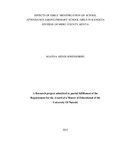| dc.description.abstract | There has been considerable attention placed on increasing schooling in developing countries and especially of the girl child. This may be attributed to the fact that studies suggest female schooling has positive effects on health, wealth, empowerment, and the health and schooling outcomes of girls' own children later. The purpose of the study was to investigate the effect of girls’ menstruation on school attendance among primary school girls in Kangeta Division in Meru County. Specifically the study investigated the effect of culture on period’s management, school menstrual etiquette, parental attitude towards period’s management, and teacher attitude towards period’s management on school attendance among primary school girls in Kangeta Division. The research adopted descriptive research design, because it renders itself better in the study of the phenomena and description of the state of affairs. The target population was all the primary school going girls in Kangeta Division. The accessible population was 1,652 standard Eight (8) pupils in Kangeta Division and 382 female teachers. A sample of 125 standard eight pupils and 39 teachers was utilized. Primary data was collected from the school going standard eight girls in primary schools and Female teacher. Questionnaires used had both structured and unstructured questions. The collected data by way of questionnaire was organized to answer set objectives in the study. The data generated from the study was analyzed on the basis of questions and specific objectives by use of both quantitative and qualitative techniques. The findings have established that majority of the respondents agreed that the cultural taboos on menstrual management affect girl’s school attendance while most of the respondents disagreed that fetching water affect girls school attendance. The study found that majority of the teachers supported the view that school management as it relates to menstrual hygiene management affected school attendance among girls. Most of the teachers agreed that lack of adequate toilet facilities hindered school attendance during menstruation. The study found that majority of the respondents agreed that Parental Attitudes towards menstrual Management affected school attendance. In conclusion, parental attitude and religious altitudes on menstruation periods influenced school attendance, thus most of the respondents agreed that parent attitudes towards girls during menstruation affected girls school attendance. The study again found that most of the respondents stated that male teacher’s attitude towards menstruation affected girl’s school attendance, while most of the respondents strongly agreed that female teacher’s attitude towards menstruation affect girl’s school attendance. The study has recommended that the cultural taboos should be re- examined with a view of taking urgent measures to rectify them so that girls are facilitated more and encouraged to attend school. The study has also recommended that school management aspects that relate to basic issues such as provision of adequate toilets and water should be catered for. The study again has recommended that since parental attitudes towards period’s management affected school attendance, they should be given seminars on the subject so that they can understand that menstruation is normal and it should not be used to keep girls from school. | en |

